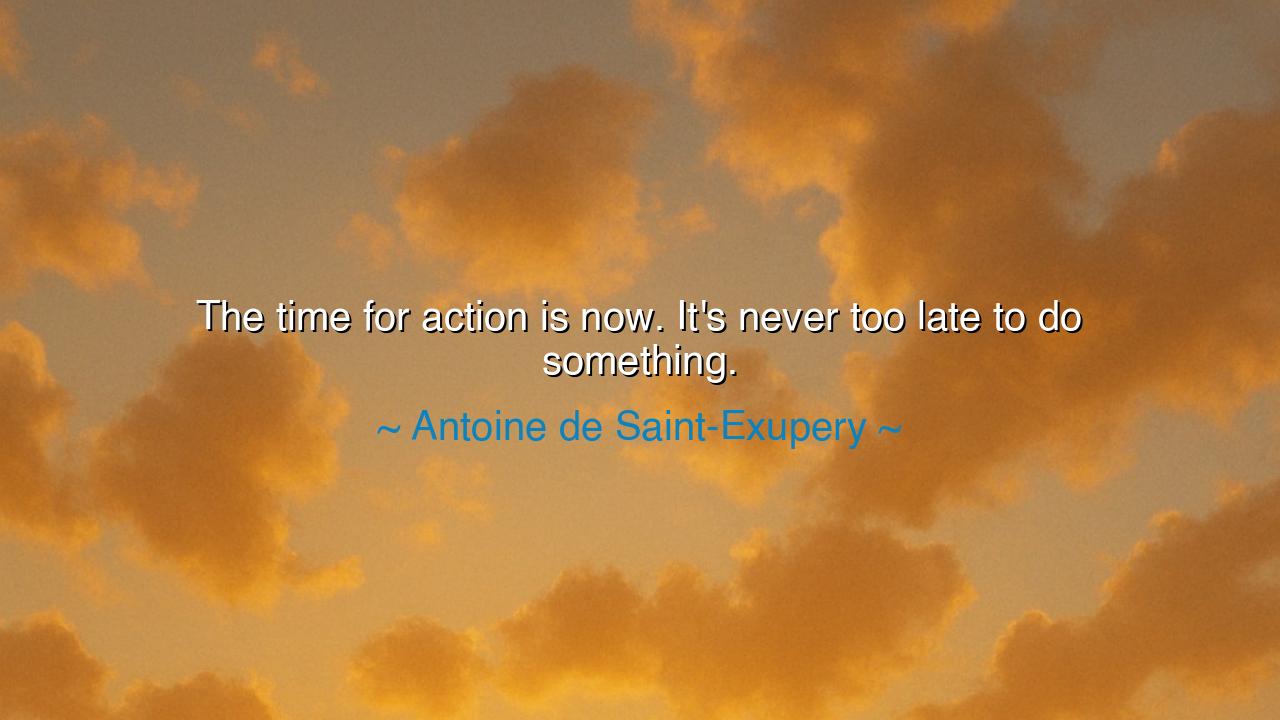
The time for action is now. It's never too late to do something.






The words of Antoine de Saint-Exupéry—“The time for action is now. It’s never too late to do something.”—resound with the urgency of one who knew that life is both fleeting and precious. Saint-Exupéry, the aviator-poet, lived in an age of turbulence, flying into storms of both sky and history. He saw with his own eyes how men wasted their hours in hesitation, waiting for perfect conditions that never arrived. His declaration is a trumpet-call: do not wait for tomorrow, for tomorrow is uncertain; do not lament what is past, for the past is beyond your grasp. Only the present moment is yours, and only in the now can you act, shape, and live.
The ancients understood this sacred truth. The Stoics taught that time is the most valuable treasure, for once lost it cannot be reclaimed. Marcus Aurelius, himself an emperor, wrote in his Meditations: “You could leave life right now. Let that determine what you do, say, and think.” His words, like those of Saint-Exupéry, remind us that delay is the thief of life. The time for action is not some distant horizon—it is always the present moment. For the present is the only battlefield where destiny is decided.
History is filled with luminous examples of those who heeded this wisdom. Consider Harriet Tubman, who might have remained a slave her whole life had she waited for the “right time” to escape. Yet in courage, she chose to act. Her first step into freedom was not delayed, and once free she returned again and again, leading others through the perilous night of bondage into the dawn of liberty. She could have told herself it was too late, too dangerous, too impossible. But by acting now, she changed not only her fate, but the fate of many.
There are also stories of those who began late, yet proved Saint-Exupéry’s second truth: “It’s never too late to do something.” Consider Grandma Moses, who did not begin painting until her seventies. She might have thought her time had passed, that her hands were too old, her days too short. Yet she began, and her art touched millions, her late flowering becoming a symbol of hope for all who think their years of creation are gone. She reminds us that while the best time to act is always now, no age, no season, no circumstance is too late to begin anew.
Beloved listener, the meaning is clear: hesitation is the greatest enemy of the human spirit. The mind invents excuses—“I am not ready, I am too old, the world is not yet prepared.” But Saint-Exupéry tears away these illusions. Now is always the time, for now is all you are given. To delay is to surrender your only true possession: the present moment. To act is to seize your life, to turn potential into reality, and to make your hours shine with meaning.
The lesson for us is both simple and profound: stop waiting. Do not wait for perfect strength, for perfect clarity, for perfect conditions—they will never come. Begin where you are, with what you have, for the act of beginning itself gives birth to strength, clarity, and opportunity. And if you have wasted years, do not drown in regret. Remember: it is never too late. Begin today, and the path you feared was lost may yet open before you.
Practical wisdom demands this: choose one thing you have delayed—an apology left unsaid, a dream left untried, a step toward health, love, or learning—and do it. Not tomorrow, not “someday,” but now. Let the present moment be consecrated by action, for it is the only altar on which destiny is shaped.
So let the words of Saint-Exupéry echo across your heart: “The time for action is now. It’s never too late to do something.” Take them as both command and comfort: command, that you act without delay; comfort, that no matter how far you have wandered, the door of possibility is not yet closed. For as long as you draw breath, you stand at the threshold of now—and now is always enough.






AAdministratorAdministrator
Welcome, honored guests. Please leave a comment, we will respond soon